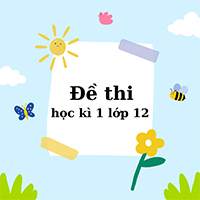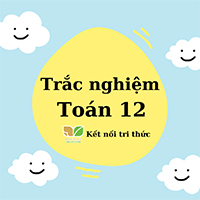Ôn tập Tiếng Anh lớp 12 Unit 7 Artificial Intelligence
Bài tập Tiếng Anh lớp 12 Unit 7 Artificial Intelligence có đáp án
Bài luyện tập Tiếng Anh 12 Unit 7: Artificial Intelligence gồm nhiều dạng bài tập trắc nghiệm Tiếng Anh khác nhau giúp học sinh lớp 12 củng cố lại kiến thức đã học về cấu trúc ngữ pháp Tiếng Anh quan trọng trong Unit và luyện đọc hiểu Tiếng Anh theo chủ đề Artificial Intelligence hiệu quả.
GRAMMAR
Exercise 1. Mark the letter A, B, C or D to indicate the correct answer to each of the following questions.
1. Drivers or pilots ____the best routes to the destination quickly and effectively.
A. have the GPS found
B. use the GPS to find
C. get the GPS find
D. get the GPS found
2. My sister____her laptop serviced last weekend.
A. did
B. got
C. made
D. took
3. You should ____ a professional to check your house for earthquake damage.
A. have
B. get
C. make
D. take
4. We ____ a cable TV put in this week.
A. are having
B. get
C. have
D. have got
5. The dishwasher isn't working again, so my mother is thinking of having____.
A. it repaired
B. it repairing
C. repaired it
D . repairing it
6. We ____ while we were on holiday.
A. had our alarm system stolen
B. had stolen our alarm system
C. got stolen our alarm system
D. were stolen our alarm system
7. The A.I. expert wanted to have his assistant ____the newly made robot.
A. activate
B. activated
C. activating
D. to activate
8. Kelly wanted a live band____ at her wedding.
A. been playing
B. to play
C. played
D. to be played
9. I spoke to Victor last night and he said he ____ while he was on holiday.
A. got stolen his phone
B. had his phone stolen
C. had stolen his phone
D. was got his phone stolen
10. Why don't you____ when you install this new electric gadget?
A. get Aaron help
B. have Aaron help
C. have Aaron helped
D. have got Aaron help
11. As soon as Dad ____, we can leave.
A. got the car to start
B. has got the car started
C. got started the car
D. was got starting the car
12. My teeth were little yellow, so I ____ by the dentist.
A. had cleaned them
B. had them cleaned
C. have them cleaned
D. was cleaned them
13. Can we____this summer?
A. get installed air-conditioning
B. get air-conditioning to install
C. have air-conditioning installed
D. have installed air-conditioning
14. The car manufacturer____two automatic systems this morning.
A. has had a robotics company install
B. had a robotic company installed
C. had a robotic company install
D. got a robotic company installed
15. The computer corporation____ malfunctioning products.
A. had their workers eliminate
B. had their workers to eliminate
C. had their workers eliminating
D. had their workers eliminated
16. The robot manufacturer____their outdated robots for the next generation robots.
A. asked his customers exchange
B. got his customers exchanged
C. had his customers exchanged
D. had his customers exchange
17. Samsung____ by those who have bought them for technical faults.
A. has all Galaxy Note 7 returned
B. has all Galaxy Note 7 to returned
C. made all Galaxy Note 7 return
D. made all Galaxy Note 7 returned
18. Experts believe that in the near future humans____.
A. have robots do the housework
B. have had the housework done by robots
C. will do the housework by robots
D. will have robots do the housework
19. Nowadays, for the sake of human life, the military ____ which contain explosives.
A. have A.I. robots explore dangerous environments
B. get A.I. robots explore dangerous environments
C. have A.I. robots explored dangerous environments
D. get A.I. robots explores dangerous environments
20. Thanks to the A. I applications, Internet users____ into a new language in real time.
A. can translate webpages
B. can have webpages translate
C. can have webpages translated
D. can get webpages to translate
21. It's hard to believe that this film ____ completely by computer.
A. has been generated
B. has generated
C. was been generating
D. was to generate
22. My sister____her ear pierced last weekend.
A. did
B. got
C. made
D. took
23. Recently, a new vaccine against measles ____.
A. has been developed
B. had been developed
C. had developed
D. was developing
24. You'd better get someone____ your house.
A. redecorate
B. redecorated
C. to be redecorated
D. to redecorate
25. The patient ____ his blood tested to find out the cause of his breakdown.
A. asked
B. had
C. ordered
D. took
26. We____that my father's new car ____ by Friday. He has promised to give his old one to me and I want to drive to York in it at the weekend.
A. expect - will have been delivered
B. are expected - will be delivering
C. have been expecting - is delivering
D. are expecting - will have delivered
27. I wish my father had bought me a new mobile phone instead of having it____ like that.
A. to repair
B. repaired
C. repairing
D. being repaired
28. We are going to____ next June, or else they will be expired.
A. get our passports renewed
B. get to renew our passports
C. have had our passports renewed
D. have our passports to renew
29. Mr. Brown tends to____his car serviced twice a year at the garage near his house.
A. have
B. let
C. rent
D. give
30. The teacher had the students____an essay on the positive and negative effects that modern technology has on children.
A. to write
B. to be written
C. write
D. writing
Exercise 2. Mark the letter A, B, C or D to indicate the underlined part that needs correction in each of the following questions.
31. Thanks to the first lawn mower which was invented (A) in 1830, we don't have to pay for (B) someone to have (C) our grass to be cut (D) any more.
32. According to the futurist Ray Kurzweil, humans could (A) have tiny computerized (B) machines or nanobots invent (C) thanks to (D) future medical advances.
33. In his (A) Aston Martin DB5 car, Bond can have the photos being printed (B) out along with (C) the information about (D) the people in them from a panel in a dashboard.
34. There's a network in (A) computing called (B) 'beta testing', which means you test something seeing (C) if it works properly before (D) it comes official.
35. No longer (A) do housewives have (B) to clean the house every day because they get it done (C) for (D) robotic vacuum cleaners.
36. Before the cotton gin had been invented (A) in 1794, American farmers had (B) cheap slaves (C) remove seeds from (D) the cotton fiber.
37. Before the invention of email and the Internet in 1972, it (A) took people at least (B) one day to cause (C) hand-written letters sent to the recipients' (D) homes.
38. In (A) communication, we can have the voice recognition systems (B) in smartphones or other (C) electronic devices to be identified (D) our speech.
39. The owners of modern manufacturing plants (A) had workers doing (B) heavy and repetitive (C) tasks replacing (D), by robots.
40. In this throw-away society, instead of (A) having an old electronics (B) device fixed (C), people tend to toss (D) it away and buy a new one.
Exercise 3. Mark the letter A.B.C or D to indicate the correct response to each of the following exchanges.
41. A: Hello, is that Liz speaking?
B: ____
A. Yes, who's that? I can hardly hear you.
B. Hello, how are you?
C. Hi, there. I'm Juliet.
D. You can leave a message, please.
42. A: Hello, could I speak to Chris, please?
B: ____
A. Sorry, he's not in.
B. Yes, you could.
C. Sure, go ahead.
D. Certainly I am.
43. A: Shall I ring you later?
B: ____
A. No, you won't.
B. Yes, but I may be out.
C. Sorry, I'm busy now.
D. I couldn't agree more.
44. A: Do you know how this machine works?
B: ____
A. It's very expensive.
B. Will you call the mechanic tomorrow?
C. Plug it in and push the green button.
D. I think it's quite heavy.
45. A: ____
B: Oh, the bulb went out when I switched it on.
A. Are there anything wrong?
B. What matters to the lamp?
C. Does the machine work properly?
D. What's wrong with the lamp?
46. A: Do you mind if I make a phone call?
B: ____
A. Yes, certainly. The phone's in the hall.
B. No, of course not. The phone's in the hall.
C. I don't think so. It's so annoying.
D. Why not? I'm using my mobile phone.
47. A: Would you take this calculator along to the office for me?
B: ____
A. Never mind.
B. Yes, with pleasure.
C. Yes, that's right.
D. Not at all.
48. A: How often do you check mail?
B: ____
A. Almost every day.
B. It's not normal.
C. It's quite far from here.
D. No, I really don't
49. A: I have bought you a new toy car. Happy birthday to you!
B: ____
A. Have a nice day!
B. The same to you!
C. What a lovely toy! Thanks.
D. What a pity!
50. A: Guess what? I've been awarded a scholarship to study about information technology in the U.S.
B: Uh, really? ____
A. Take care of yourself!
B. Congratulations!
C. You are always lucky!
D. Lucky as you are!
51. A: ____
B: Yes. I'd like to buy a computer.
A. Do you look for something?
B. Good morning. Can I help you?
C. Excuse me. Do you want to buy it?
D. Can you help me buy something?
52. A: Can you help me carry this vacuum cleaner upstairs?
B: ____
A. I think that, too.
B. Yes, I'm afraid not.
C. Not completely.
D. Why not?
53. A: I believe that modern robots will be more intelligent and replace humans in many dangerous jobs.
B: ____
A. That's just what I think of course.
B. That sounds interesting.
C. That's a good idea.
D. Why not? Believe me!
54. A: Watching television is a waste of time.
B: ____
A. I enjoy watching cartoons.
B. I don't think so either.
C. I think so, too.
D. News is not my favorite program.
55. A: Do you like using a desktop computer or laptop?”
B: ____
A. Yes, I'd love to.
B. I couldn't agree more.
C. No, I have no choice.
D. I prefer something portable.
READING
Exercise 4. Read the following passage and mark the letter A, B, C or D to indicate the correct answer to each of the questions.
SCIENCE FLYING IN THE FACE OF GRAVITY
It looked just like another aircraft from the outside. The pilot told his young passengers that it was built in 1964, a Boeing KC-135 refuelling tanker, based on the 707. But appearances were deceptive, and the 13 students from Europe and the USA who boarded the aircraft were in for the flight of their lives.
Inside, the area that normally had seats had become a long white tunnel. Heavily padded from floor to ceiling; it looked a bit like a lunatic asylum. There were almost no windows, but lights along the padded walls eerily illuminated it. Most of the seats had been taken out apart from a few at the back, where the young scientists quickly took their places with a look of apprehension.
From 12 months, science students from across the continents had competed to win a place on the flight at the invitation of the European Space Agency. The challenge had been to suggest imaginative experiments to be conducted in weightless conditions. For the next two hours the Boeing's flight resembled that of an enormous bird which had lost its reason, shooting upwards towards the heavens before hurting towards Earth. The intention was to achieve weightlessness for a few seconds.
The aircraft took off smoothly enough, but any feelings that I and the young scientists had that we were on anything like a scheduled passenger service were quickly dismissed when the pilot put the plane into a 45-degree climb which lasted around 20 seconds. Then the engine cut out and we became weightless. Everything became confused, and left or right, up or down no longer had any meaning. After 10 seconds of free-fall descent, the pilot pulled the aircraft out of its nosedive. The return of gravity was less immediate than its loss, but was still sudden enough to ensure that some students came down with a bump.
After two hours of going up and down in the plane doing experiments, the predominant
feeling was one of exhilaration rather than nausea. Most of the students thought it was an unforgettable experience and one they would be keen to repeat.
56. What does the writer say about the plane?
A. It had no seats.
B. It had no windows.
C. The inside was painted white.
D. The outside was misleading
57. What does the word eerily in paragraph 2 mean?
A. badly B. brightly C. clearly D. strangely
58. What did the pilot do with the plane?
A. He climbed and made the plane turn over.
B. He climbed and made the plane fall slowly.
C. He quickly climbed and stopped the engines.
D. He took off normally and then cut the engines for 20 seconds.
59. What does the word it in the last paragraph refer to?
A. the exhilaration B. the opportunity C. the plane D. the trip
60. Why was this passage written?
A. To encourage young people to take up science.
B. To describe the outcome of a scientific competition.
C. To report on a new scientific technique.
D. To show scientists what young people can do.
Exercise 5. Read the following passage and mark the letter A, B, C or D to indicate the correct answer to each of the questions.
The word “robot” first appeared in a 1921 stage play by Czech writer Karel Capek. Intheplay, a man makes a machine that can think, which he calls a robot and which ends upkilling its owner. In the 1940s, the American science fiction writer, Isaac Asimov, wroteaseries of stories about robots and invented the term 'robotics', the science of robots. Meanwhile, in the real world, the first robots were developed by an engineer, Joseph F. Engelberger, and an inventor, George C. Devol. Together they started Unimation, a manufacturing company that produced the first real robot in 1961, called the Unimate. Robots of this type were installed at a General Motors automobile plant and proved to be a success. They worked reliably and saved money for General Motors, so other companies were soon acquiring robots as well.
These industrial robots were nothing like the terrifying creatures that can often be seen in science fiction films. In fact, these robots looked and behaved nothing like humans. They were simply pieces of computer-controlled machines, with metal "arms" or "hands". Since they were made of metal, they could perform certain jobs that were difficult or dangerous for humans, particularly jobs that involve high heat. And since robots were tireless and never got hungry, sleepy, or distracted, they were useful for tasks that would be tiring or boring for humans. Industrial robots have been improved over the years, and today they are used in many factories around the world. Though the use of robots has meant the loss of some jobs, at the same time other jobs have been created in the design, development, and production of the robots.
Outside of industry, robots have also been developed and put into use by governments and scientists in situations where humans might be in danger. For example, they can be sent into investigate an unexploded bomb or an accident at a nuclear power plant. Researchers also use robots to collect samples of hot rocks or gases in active volcanoes. In space exploration, robots have performed many key tasks where humans could not be present, such as on the surface of Mars. In 2004, two robotic Rovers, small six-wheeled computerized cars, were sent to Mars.
61. When did the word robot appear?
A. before the 1920s B. in the early 1920s
C. in the mid-1920s D. in the late 1920s
62. Which of these statements is TRUE about Karel Capek?
A. He is a famous American playwright.
B. He was the first to create the word “robot”.
C. He invented a machine that can think like humans.
D. He made a robot kill a person.
63. What does the word they in paragraph 2 refer to?
A. terrifying creatures B. humans
C. science fiction films D. industrial robots
64. What are industrial robots like?
A. They are computer-controlled machines.
B. They are built with metal arms and legs.
C. They behave like humans.
D. They can humans.
65. Which of the following is NOT mentioned as a characteristic of robots?
A. They never need food to survive.
B. They can survive without any sleep.
C. They are tired like humans.
D. They can do jobs involving intense heat.
66. What can be inferred from the passage about robots?
A. Their appearance negatively affects the job market.
B. They can stop active volcanoes from erupting.
C. They help humans travel to the outer space.
D. They take away some jobs but offer some in return.
67. Which of the following best paraphrases the sentence in bold in the first paragraph?
A. Because they were reliable and economical to General Motors, other companiesstarted to use robots.
B. Other companies started to produce reliable and efficient robots for General
Motors.
C. Every other company made use of robots because they were time-consumingandsafe.
D. Robots worked well for General Motors, but caused certain trouble to others.
68. What is the author's attitude towards robots in this passage?
A. He appreciates them.
B. He dislikes them.
C. He thinks they are a nuisance.
D. He is crazy about them.
Exercise 6. Read the following passage and mark the letter A, B, C or D to indicate the correct word or phrase that best fits each of the numbered blanks.
MODERN SCIENCE
It seems entirely (119) ____ to us that there are teams of scientists in universities and (120) ____ institutions around the world, attempting to (121) ____ the way the world works. However, it hasn't always been that (122) ____. Although the scientific method is now four or five hundred years old, the ancient Greeks, for example, believed that they could work out the (123) ____ of natural events just by the power of thought.
During the 17th century, more and more people began to realize that they could (124) ____ their scientific ideas by designing a relevant (125) ____ and seeing what happened. A lot of (126) ____ was made in this way by individual scientists. These men and women often worked alone, carrying out (127) ____ into many different areas of science, and they often received very little (128) ____ for their hard work. (129) ____ the start of the 20th century, though, it became (130) ____ that science was becoming more complicated and more expensive. This individual scientist disappeared, to be replaced by highly qualified teams of experts. Modern science was born.
69. A. natural B. physical C. unreal D. typical
70. A. another B. every C. other D. whole
71. A. construct B. create C. discover D. invent
72. A. method B. route C. technique D. way
73. A. aims B. causes C. purposes D. reasons
74. A. calculate B. collect C. measure D. test
75. A. analysis B. attempt C. experiment D. event
76. A. development B. evolution C. movement D. progress
77. A. discovery B. education C. experiment D. research
78. A. present B. gift C. prize D. reward
79. A. At B. In C. On D. For
80. A. accurate B. actual C. clear D. true
ĐÁP ÁN
Exercise 1. Mark the letter A, B, C or D to indicate the correct answer to each of the following questions.
1 - B; 2 - B; 3 - B; 4 - A; 5 - A;
6 - A; 7 - A; 8 - B; 9 - B; 10 - B;
11 - B; 12 - B; 13 - C; 14 - C; 15 - A;
16 - D; 17 - A; 18 - D; 19 - A; 20 - C;
21 - A; 22 - B; 23 - A; 24 - D; 25 - B;
26 - A; 27 - B; 28 - A; 29 - A; 30 - C;
Exercise 2. Mark the letter A, B, C or D to indicate the underlined part that needs correction in each of the following questions.
31 - D; 32 - C; 33 - B; 34 - C; 35 - D;
36 - A; 37 - C; 38 - D; 39 - D; 40 - B;
Exercise 3. Mark the letter A.B.C or D to indicate the correct response to each of the following exchanges.
41 - A; 42 - A; 43 - B; 44 - C; 45 - D;
46 - B; 47 - D; 48 - A; 49 - C; 50 - B;
51 - B; 52 - D; 53 - A; 54 - C; 55 - D;
READING
Exercise 4. Read the following passage and mark the letter A, B, C or D to indicate the correct answer to each of the questions.
56 - D; 57 - D; 58 - C; 59 - D; 60 - B;
Exercise 5. Read the following passage and mark the letter A, B, C or D to indicate the correct answer to each of the questions.
61 - A; 62 - B; 63 - D; 64 - A; 65 - C; 66 - D; 67 - A; 68 - A;
Tải trọn bộ nội dung tại đây: Ôn tập Tiếng Anh lớp 12 Unit 7 Artificial Intelligence có đáp án.










